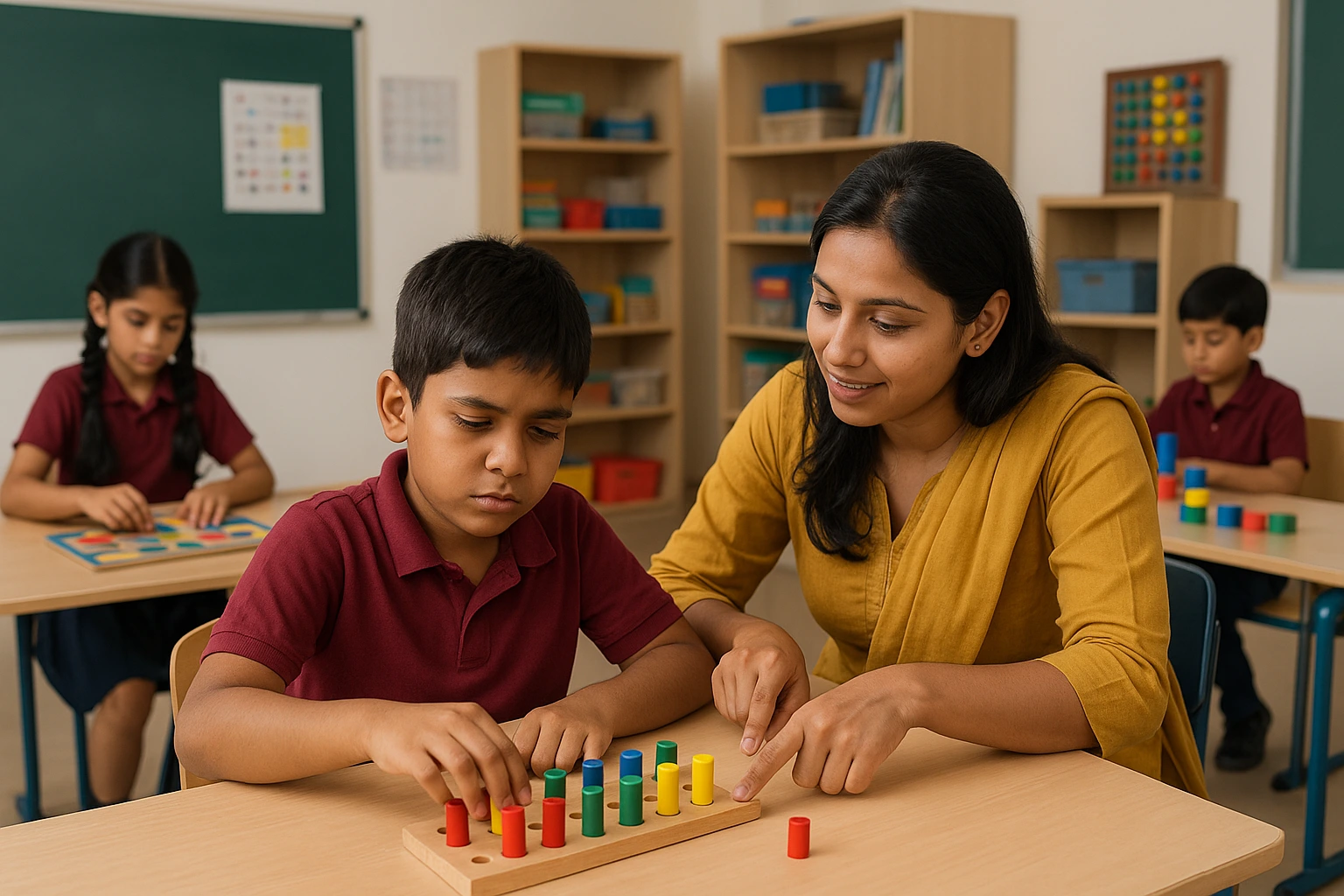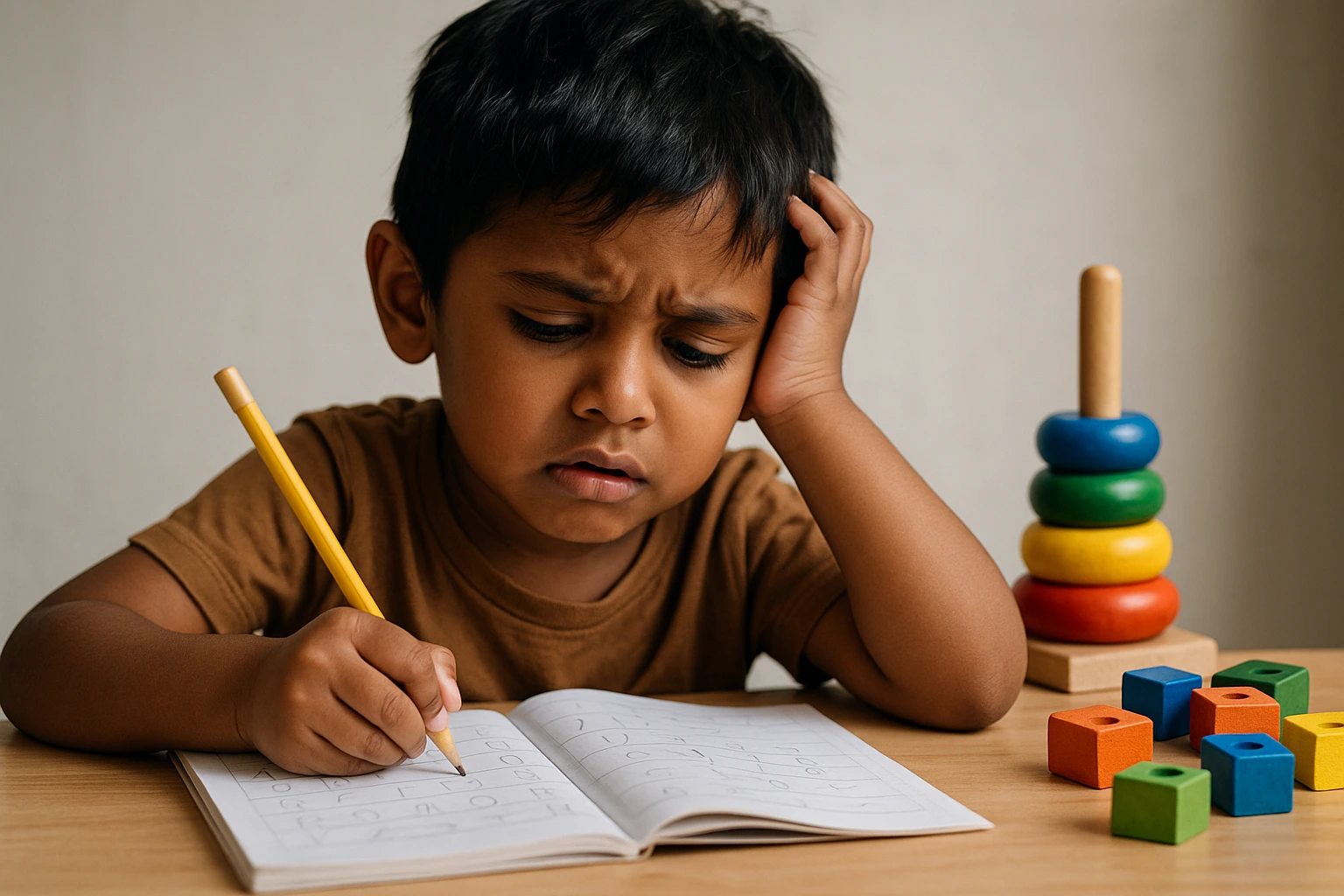Types of Learning Disabilities in Children?
Types of Learning Disabilities in Children?
Learning Disability is an umbrella term that includes a wide array of specific learning disorders that affect the learning skills of the child, hampering their academic and social progress. These disabilities are a result of some neurological dysfunction, due to which the child’s information processing powers are impacted.
When the child has issues in acquiring basic learning skills despite his appropriate age, parents and educators can sense a red flag. To address these red flags, it is a must to acquire a formal diagnosis at the earliest to protect the child from the concluding perils of learning disorders that can restrict his engagement in a mainstream classroom.
Every learning disability poses varied challenges, and two children with the same learning disorder don’t need to have the same set of issues. Therefore, scrutinizing the child’s developmental delays and finding out the type of learning disability helps to lay down a solid foundation of basic learning skills, meeting each child’s needs.
Table of Content
Types of Learning Disabilities
Every learning difficulty impacts a certain specific learning skill and brings with it a separate set of challenges. Therefore, determining the type of learning disability is extremely important to understand the real areas of concern for the child and accordingly assist the child to make their learning journey more enriching and with less stress.
Here are the most common types of learning disabilities explained in detail:
Dyslexia (Reading Disability)
When the child fails to recognize letters and cannot connect them with their sound, it can result in a series of reading issues known as Dyslexia. Child faces difficulties in reading fluently as they cannot process the information correctly, leading to confusion while reading similar-looking letters.
Affects a kid’s ability to read, spell, and identify words. This is one of the most identified types of learning disabilities.
Dysgraphia (Writing Difficulty)
Dysgraphia is a disorder that hampers the child’s writing and motor planning skills. A child finds it difficult to put their thoughts on paper due to poor spatial awareness. This type affects both the physical act of writing and written expression.
Dyscalculia (Math Disability)
Dyscalculia affects number sense and mathematical reasoning. Children may have trouble learning basic math facts, understanding number relationships, or solving word problems. Among the types of learning disabilities, this one is often less recognized but equally challenging.
Auditory Processing Disorder (APD)
As the name Children with APD find it difficult to process sounds and spoken language. They may confuse similar sounds, struggle to follow verbal instructions, or need more time to respond. This disorder affects listening and understanding even when hearing is normal.
Visual Processing Disorder
This affects how visual information is interpreted. A child might confuse shapes, skip lines while reading, or struggle with visual memory. This is another lesser-known but important type among the types of learning disability.
Timely recognition of various learning disorders helps to chalk out a suitable intervention plan for the child based on his strengths and targets the areas of concern for him. With proper support, children can make steady progress despite these challenges.
Click here to download the brochure of the LD Course!
Call or WhatsApp on +919321024137 / +919869866277, to know about the LD Course!

Symptoms of Learning Disabilities
Understanding the symptoms is key to identifying different types of learning disabilities in kids. These signs may seem early in a child’s development and often continue through school years. Early identification helps in offering correct support based on the specific types of learning disabilities.
Here are some common symptoms explained in detail:
Difficulty with Reading and Writing
Children may have difficulty recognizing letters, matching sounds to letters, or spelling basic words. This indicates the presence of dyslexia, which is one of the most common types of learning disabilities. Children may be non-compliant when asked to read aloud and demonstrate increased frustration during literacy tasks.
Trouble Understanding Math Concepts
If a child has problems with number recognition, counting, or basic arithmetic, they might be dealing with dyscalculia. This is another specific example within the types of learning disabilities, affecting logical thinking and numerical understanding.
Inadequate Memory retention aptitude
Children who possess learning disabilities have low aptitude for retaining important information. They tend to forget instructions or struggle to focus due to which they end up resulting in incomplete work and assignments. This affects the functionality of the child, and routines get affected.
Weak Attention and Focusing
Children with disorders like ADHD get distracted very easily and tend to divert from what is being done in class. Due to this, they cannot complete their work on time and have poorly organised surroundings.
Communication Issues due to Inadequate Language Skills
As children find it difficult to identify letters and their sounds, they suffer immensely with vocabulary, understanding instructions, and cannot form sentences properly. Language or Communication problems often can be seen in learning disabilities based on language processing.
Poor eye-hand coordination
When the child finds it difficult to perform tasks that need proper eye-hand coordination, it can be a sign of dyspraxia, a disorder that affects the child’s motor planning skills. Due to meagrely developed coordination skills, the child’s moving around is an issue, with him bumping into things is a common problem.
Recognizing these signs early can lead to effective intervention suited to the child’s unique learning needs.
Click here to download the brochure of the LD Course!
Call or WhatsApp on +919321024137 / +919869866277, to know about the LD Course!

Source: f4training
Diagnosing Learning Disabilities
Learning disabilities do not interfere with the intelligence of the child. But the impact of the learning disabilities restricts the child from processing information like any average learner does, due to their failure to achieve their true potential.
When the root cause of the child’s struggle is determined, it helps to attain a formal diagnosis if the child has a learning disability. Once a diagnosis is received, it becomes easy to help the child address his learning needs and help him comfortably decode information.
Early recognition of signs and getting a formal diagnosis helps to start the intervention strategies that will provide suitable solutions for the specific learning needs of the child, enabling them to thrive academically and socially in a regular classroom setup. The identification of learning disabilities includes a number of key steps in designing a plan to ensure that a picture is created of the child’s strengths as well as their weaknesses.
Observation by Parents and Teachers
Early signs usually appear in the classroom or home settings. A child may struggle with reading, writing, listening, or mathematics. Spotting patterns in these difficulties helps in identifying specific types of learning disabilities.
Description of the child’s developmental and academic
A systematic portfolio of the child, comprising his achievement of crucial developmental milestones and grades, helps to establish if the child needs formal testing. When the child consistently misses achieving essential milestones in terms of language skills and gross motor development, it can be an alarming sign that the child might be suffering from specific learning disorders.
Homogenized Assessment
Children are assessed by using Standardized Testing methods that measure their cognitive abilities, communication skills, and educational performance. On the basis of the reports of the child there can be a formal diagnosis made to indicate any types of learning disabilities.
Psychological Reviewing
This action concentrates on determining how the child manages the tasks of deciphering information. This review assesses the skills of memory, attention, and critical thinking. This helps to determine the accurate issues that are concerning the child.
Rule Out Other Causes
Before a formal diagnosis of the child’s condition is given, it is extremely crucial to establish important facts about whether the child has any hearing or vision issues that can also be a cause for poor academic progress. Once these issues are accurately determined, the diagnosis is full-proof with no doubts or second thoughts.
Collaboration with Experts
Diagnosis brings the different stakeholders of the child’s overall journey together, where they discuss the child’s progress, give each other valuable feedback that helps to give the child accurate assistance for his overall holistic development.
Through careful diagnosis, the various types of learning disabilities can be addressed early, improving the child’s learning experience and confidence.
Click here to download the brochure of the LD Course!
Call or WhatsApp on +919321024137 / +919869866277, to know about the LD Course!

Getting Help for Children with Learning Disabilities
Recognizing and distinguishing between the specific categories of learning disabilities is the first step in providing meaningful support to a child who experiences a learning challenge involving atypical learning. Learning disabilities may occur in many ways–in reading, writing, math, the development of reasoning skills, or language comprehension. Each child will struggle with learning in a unique manner, which highlights the importance of securing early support. The encouraging news is that a very positive form of support exists. Institutions like Vidhyanidhi Education Society (Govt. Regd.) offer Learning Disability Courses that prepare educators and parents to identify and manage these issues early and effectively.
Here’s how help can be provided:
Early Identification and Assessment
Long-term learning difficulties can be avoided by early identification of their learning disorder. Professional special educators should utilise advanced tools to track the child’s progress and understand the real challenges effectively.
Individualized Education Plans (IEPs)
IEPs are meticulously designed learning plans that are based on the diverse learning needs of the child, depending on the types of learning disabilities that are diagnosed. IEPs are tailored as per the child’s learning preferences that modify lessons and methods to ensure that the child achieves his goals with confidence.
Support from Trained Educators
Teachers trained under an ideal Learning Disability Course are equipped with detailed knowledge and customised strategies using multi-sensorial formats, focusing on the strengths of the child, enabling them to grasp topics thoroughly.
Parental Involvement and Awareness
Parents who take Learning Disability Courses gain the knowledge to help support learning at home. When Parents are well-versed with the challenges of learning disorders, they understand the child’s struggles well, promote their learning at home, and coordinate with their teachers and professionals to give the best possible support to the child.
Emotional and Social Support
Children with learning challenges may suffer from low confidence. Positive reinforcement, counselling, and peer support can be very effective.
Vidhyanidhi Education Society (Govt. Regd.) plays a key role by offering practical, accessible Learning Disability Courses that empower both educators and families. These efforts are important in helping children succeed despite the types of learning disabilities they face.
Help children thrive—join Vidhyanidhi’s LD Course and make a real impact today!
Click here to download the brochure of the LD Course!
Call or WhatsApp on +919321024137 / +919869866277, to know about the LD Course!
FAQs
Is Learning Disability Curable?
Learning disabilities are a lifelong condition with no defined or set cure, but with the help of individualised support, the challenges caused can be managed effectively.
Is Autism a Learning Disability?
Autism is a neurological disorder, but not a learning disorder, that has certain impacts that can affect the learning skills of the child. Not a learning disability, but some individuals with autism may also have co-existing learning disabilities.





